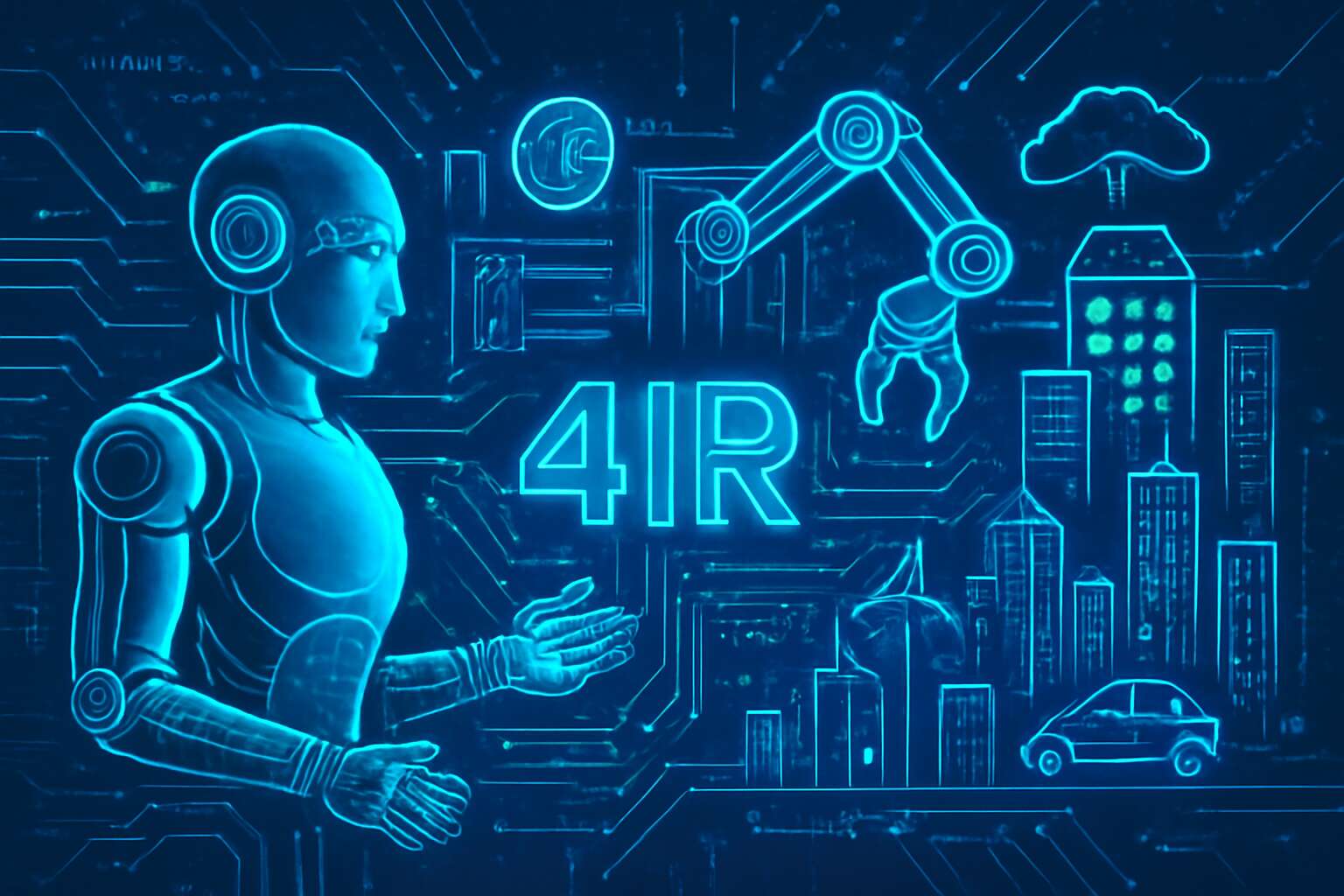Understanding the Fourth Industrial Revolution (4IR)
Definition and Core Concepts – Explaining what 4IR is and its foundational technologies
The Fourth Industrial Revolution (4IR) embodies a seismic shift in how technology intertwines with the fabric of society, blurring the boundaries between the physical, digital, and biological worlds. Unlike previous revolutions driven solely by mechanisation or digitisation, 4IR’s core technologies catalyse a profound transformation—one that redefines productivity, innovation, and human interaction itself. Its significance lies in unlocking unprecedented opportunities for growth, yet it also poses complex challenges that demand careful navigation.
At its heart, 4IR is characterised by a constellation of foundational technologies that serve as the backbone of this new era. These include artificial intelligence (AI), the Internet of Things (IoT), blockchain, and advanced robotics. Together, they forge a networked ecosystem where data flows seamlessly, enabling real-time decision-making and adaptive systems. To grasp why is 4ir important, one must recognise how these interconnected innovations accelerate societal progress, reshape economies, and influence organisational paradigms.
- Artificial Intelligence (AI): Empowering machines with cognitive capabilities that mimic human thought processes.
- Internet of Things (IoT): Connecting everyday objects to facilitate intelligent environments and smart cities.
- Blockchain: Ensuring transparency and security in digital transactions across decentralised platforms.
- Advanced Robotics: Automating complex tasks, leading to increased efficiency and new operational possibilities.
Historical Context – Comparison with previous industrial revolutions
The tapestry of human progress has always been woven through transformative epochs, yet none so intricately as the Fourth Industrial Revolution (4IR). Historically, each revolution has punctuated societal evolution—shifting economies, redefining labour, and recalibrating cultural paradigms. The First Industrial Revolution, with its steam-powered machinery, set the stage for mass production. The Second, driven by electricity and assembly lines, turbocharged growth. The Third, heralded by digitisation and automation, digitalised industries and interconnected the world in unprecedented ways. But 4IR surpasses these milestones, blending physical, digital, and biological realms into an interconnected ecosystem that challenges our understanding of what is possible.
The importance of 4IR becomes even clearer when considering its acceleration of societal progress. Unlike previous revolutions, which unfolded over decades, 4IR’s technological convergence occurs at an exponential pace, reshaping entire industries overnight. This rapid evolution raises the question: why is 4IR important? It is because it unlocks a new dimension of innovation—where artificial intelligence, blockchain, and advanced robotics collaborate seamlessly—creating opportunities that were once confined to science fiction. Yet, it also demands a nuanced understanding of the profound shifts in organisational paradigms and societal structures, compelling us to navigate this brave new world with both curiosity and caution.
Key Technologies Powering 4IR – Artificial intelligence, Internet of Things, robotics, blockchain, and more
The Fourth Industrial Revolution (4IR) is not just a technological leap; it’s a seismic shift that redefines the very fabric of our society. At its core, 4IR harnesses a suite of transformative technologies that are reshaping industries and everyday life alike. Among these, artificial intelligence (AI) stands out as the engine driving automation and intelligent decision-making, while the Internet of Things (IoT) connects devices in a seamless web of data exchange. Robotics, increasingly sophisticated, are now performing tasks once thought exclusive to humans, from manufacturing to healthcare.
Furthermore, blockchain technology introduces a new level of security and transparency to transactions, fostering trust in digital ecosystems. When combined, these technologies create a potent ecosystem where innovation accelerates at an unprecedented rate. To better understand the scope, consider this:
- Artificial intelligence enhances machine learning, enabling systems to adapt and improve autonomously.
- IoT devices collect vast amounts of real-time data, powering smarter cities and industries.
- Robotics automate complex tasks, increasing efficiency and safety across sectors.
- Blockchain ensures decentralised security, transforming financial and supply chain operations.
Why is 4IR important? Because it pushes the boundaries of what is possible, challenging traditional notions of work, community, and progress. It’s a catalyst for innovation that demands our keen understanding and strategic adaptation, making it essential for organisations and societies to navigate this brave new world intelligently.
Economic Impact of 4IR
Driving Innovation and Productivity – How 4IR boosts efficiency across various industries
The Fourth Industrial Revolution (4IR) is transforming our economic landscape in ways that once seemed unimaginable. Its profound impact on driving innovation and productivity is reshaping industries and redefining global competitiveness. But why is 4IR important? Because it unlocks new avenues for efficiency and growth that were previously beyond reach.
Across sectors—from manufacturing to healthcare—4IR technologies foster smarter workflows, enabling organisations to optimise resources and reduce waste. For instance, artificial intelligence algorithms can predict market trends with remarkable accuracy, while the Internet of Things (IoT) creates interconnected systems that streamline operations. This technological synergy leads to a significant boost in productivity, pushing industries to innovate faster and more effectively.
- Enhanced automation reduces manual labour and error margins, allowing human talent to focus on complex problem-solving.
- Real-time data analysis provides insights that drive strategic decision-making, fostering agility in competitive markets.
- Digital twins and simulation tools enable testing of concepts without costly physical prototypes, accelerating product development cycles.
Ultimately, understanding why is 4IR important becomes clear—it amplifies economic resilience, stimulates new markets, and encourages a culture of continuous innovation that is vital for thriving in today’s rapidly evolving global economy.
Creating New Market Opportunities – Emergence of new business models and sectors
The Fourth Industrial Revolution isn’t just a buzzword; it’s a catalyst for economic transformation. Companies are discovering new market opportunities that redefine how business is done. From digital platforms creating entirely new sectors to innovative business models that challenge traditional industries, the landscape is shifting fast. This begs the question: why is 4ir important? Because it directly fuels the emergence of these fresh avenues for growth.
New sectors such as digital finance, autonomous transport, and personalised healthcare are flourishing thanks to 4IR technologies. These sectors are not just extensions of existing industries but entirely new markets with vast potential. For example, blockchain technology has unlocked decentralised finance, while IoT-enabled devices are creating smart cities and connected homes. This diversification enhances economic resilience and encourages entrepreneurs to explore uncharted territory.
- Increased market reach through digital channels
- Development of innovative products and services
- Creation of high-tech jobs and specialised roles
Understanding why is 4ir important helps us appreciate its power to accelerate economic growth. It opens doors to sectors previously limited by technology, offering unprecedented opportunities for businesses and investors alike. In essence, 4IR is reshaping the very fabric of the global economy, making it vital for sustainable development and long-term competitiveness.
Influence on Global Competitiveness – Why adopting 4IR is crucial for economic growth and staying ahead
The global economy is at a pivotal crossroads, and the question of why is 4IR important has never been more urgent. As nations harness the transformative power of Industry 4.0, they unlock unparalleled opportunities for economic growth and global competitiveness. The advent of advanced technologies like artificial intelligence, blockchain, and IoT is driving a profound shift in how industries operate and compete on the world stage.
Those who embrace this revolution gain a strategic advantage, positioning themselves ahead of the curve in a rapidly evolving marketplace. Countries and companies investing in 4IR are creating high-tech jobs, fostering innovation, and expanding their market reach through digital channels. This dynamic environment not only boosts productivity but also cultivates resilience — essential qualities in a time of global uncertainty.
- Innovation-driven growth that sustains long-term competitiveness
- Development of new sectors and business models that redefine market boundaries
- Enhanced capacity for global trade and cross-border collaboration
Understanding why is 4IR important helps us appreciate its role as a catalyst for economic resilience and social progress. It’s not merely about technological advancement; it’s about shaping a future where nations thrive in an interconnected, digital economy. The real question is, who will seize the opportunities and redefine the rules—those who adapt to 4IR or those left behind in its wake?
Societal and Cultural Significance
Job Transformation and Future Workforce – Changing job landscapes and skills requirements
The dawn of the Fourth Industrial Revolution whispers a haunting truth: the very fabric of society is unraveling and reweaving itself into unfamiliar patterns. As machines and humans intertwine with unsettling intimacy, the societal and cultural landscape shifts beneath our feet, demanding a new understanding of work and identity. The question lingers—why is 4IR important? It is because this transformation does not merely reshape industries; it redefines the essence of human labour and community.
Job transformation in this era is swift and relentless. Roles once deemed sacred are now ghostly echoes, replaced or augmented by intelligent automation. The future workforce must adapt to a labyrinth of changing skills requirements, where digital literacy and cognitive agility are the new survival tools. In this shadowy dance of progress, the need for continuous learning becomes vital, lest humanity fall into obsolescence amidst the spectral glow of technological prowess.
Enhancing Quality of Life – Smart cities, healthcare innovations, and improved public services
In the shadowed corridors of progress, the Fourth Industrial Revolution emerges as a harbinger of profound societal transformation. Its impact reaches beyond mere technological advancement, weaving a tapestry of innovation that elevates the very fabric of daily life. The question lingers—why is 4ir important? Because it heralds a new era where cities pulse with intelligent infrastructure, and healthcare becomes a realm of personalised salvation.
Smart cities breathe with a newfound vitality, harnessing the Internet of Things to optimise traffic, conserve energy, and enhance safety. Public services evolve into seamless, interconnected systems that anticipate needs before they are voiced—a digital symphony of efficiency. Innovations in healthcare, driven by artificial intelligence and robotics, offer hope for earlier diagnoses and tailored treatments, transforming the human condition. To truly grasp the gravity of this revolution, one must recognise its capacity to redefine community and elevate quality of life in ways once relegated to the realm of fantasy.
- Enhanced urban living through intelligent infrastructure
- Revolutionised healthcare with personalised medicine
- Streamlined public services for greater accessibility
Addressing Global Challenges – Using technology to solve climate change, poverty, and health issues
In a world facing mounting challenges like climate change, poverty, and global health crises, the question isn’t just “what is happening?” but rather, why is 4IR important in turning the tide. This technological revolution isn’t just about shiny gadgets—it’s a catalyst for sustainable solutions that can reshape entire societies. Imagine harnessing artificial intelligence and blockchain to track carbon emissions, ensuring transparency in our fight against climate change. Or deploying IoT devices to optimise resource use in impoverished regions, making a tangible dent in poverty levels.
By leveraging innovative technologies, 4IR offers a real shot at addressing these pressing issues. For instance, data-driven healthcare improves disease management, saving millions, while intelligent agriculture can bolster food security. The revolution’s impact stretches across borders—fostering a new era where global challenges are met with smarter, more effective responses. Ultimately, understanding why is 4IR important reveals a pathway to a more equitable and resilient future for all humanity.
Technological Advancements and Innovation
Driving Digital Transformation – How 4IR accelerates digital integration in businesses
In an era where technological breakthroughs redefine the very fabric of commerce and society, understanding why is 4IR important becomes paramount. This Fourth Industrial Revolution isn’t just a progression; it’s a seismic shift driven by cutting-edge innovations that reshape how businesses operate and compete. The rapid integration of technologies such as artificial intelligence, the Internet of Things, and robotics accelerates digital transformation, creating a new landscape where agility and adaptability are essential for survival.
By harnessing these advanced tools, companies can streamline operations, enhance customer experiences, and unlock unprecedented efficiencies. For example, many organisations now rely on blockchain to secure transactions or utilise smart sensors to optimise supply chains. These innovations not only bolster productivity but also ignite new market opportunities, paving the way for innovative business models and sectors. The question of why is 4IR important is answered by its capacity to revolutionise industries and redefine global competitiveness.
Encouraging Research and Development – Fostering innovation ecosystems
In the swirling dance of progress, technological advancements serve as the heartbeat of the Fourth Industrial Revolution, igniting sparks of innovation that illuminate new pathways for growth. The importance of fostering research and development within this realm cannot be overstated—it’s the fertile ground where ideas blossom into transformative realities. When organisations embrace this spirit of exploration, they cultivate innovation ecosystems that ripple outward, inspiring collaboration across industries and borders.
To truly understand why is 4ir important, one must recognise its power to unlock endless possibilities. Encouraging research and development fuels this revolution, transforming visionary concepts into tangible solutions. Consider the integration of smart sensors, blockchain, and artificial intelligence—these technological marvels are not just tools but catalysts for creative synergy. Here’s a simple yet profound framework:
- Investing in cutting-edge R&D accelerates the emergence of revolutionary products and services.
- Collaborative innovation ecosystems foster cross-disciplinary breakthroughs that redefine market standards.
- Continuous experimentation propels industries forward, ensuring adaptability in an ever-changing landscape.
As the world pivots towards a future shaped by relentless innovation, the role of research and development becomes the beacon guiding us through uncharted waters. It’s this relentless pursuit of knowledge that makes understanding why is 4ir important not just relevant but vital for those eager to thrive in the era of technological marvels.
Role of Data and Connectivity – Big Data, 5G, and their importance in 4IR
The rapid surge of data and connectivity in the Fourth Industrial Revolution is transforming the very fabric of modern society. Big Data isn’t just a buzzword; it’s the engine driving smarter decision-making, personalised experiences, and predictive analytics that anticipate needs before they arise. Meanwhile, 5G technology unlocks unprecedented speeds and ultra-reliable low latency, enabling seamless communication between billions of devices. This hyper-connectivity accelerates innovation, making it possible to develop real-time solutions that were once confined to science fiction.
Why is 4ir important? The answer lies in its ability to harness these technological advancements to create a more dynamic, efficient world. For example, industries now leverage big data to refine operations and optimise supply chains, while 5G facilitates instant data transfer in autonomous vehicles and smart infrastructure. Together, these innovations forge a landscape where digital transformation becomes inevitable, reshaping markets and societal norms alike.
- Enhanced data analytics capabilities provide deeper insights, empowering smarter business strategies.
- High-speed connectivity supports complex IoT ecosystems that revolutionise manufacturing, healthcare, and urban planning.
- Real-time data exchange enables proactive responses to emerging challenges, boosting resilience across sectors.
In essence, the confluence of big data and 5G exemplifies why is 4ir important — it not only unlocks new economic opportunities but also fosters a future where digital and physical worlds intertwine seamlessly, creating a resilient, innovative global ecosystem.
Strategic Importance for Governments and Policy Makers
Formulating Forward-Thinking Policies – Supporting technological adoption and innovation
In the labyrinth of modern governance, understanding why is 4IR important is no longer a luxury but a necessity. As digital prowess becomes the cornerstone of global influence, governments and policy makers stand at a pivotal crossroads, tasked with crafting forward-thinking policies that transcend traditional boundaries. The power of 4IR — the Fourth Industrial Revolution — lies in its capacity to reshape societal frameworks, fostering innovation that propels nations into a future brimming with opportunity and resilience.
Strategic adoption of these transformative technologies ensures nations remain competitive on the world stage. Supporting technological adoption and innovation is not merely an economic imperative but a moral one, as it directly influences the quality of life for citizens. Governments that understand why is 4ir important are better equipped to develop policies that catalyse sustainable growth, address complex global challenges, and cultivate an ecosystem where innovation thrives. This proactive stance secures a future where technology serves as a bridge, not a barrier, guiding societies towards prosperity and shared progress.
Ensuring Inclusive Growth – Bridging the digital divide and fostering equitable development
In a world teetering on the edge of profound transformation, understanding why is 4IR important is no longer a theoretical exercise but a moral imperative. As digital innovation accelerates at an unprecedented pace, governments face a critical crossroads—whether to lag behind or to lead with inclusive strategies that bridge the digital divide.
Strategic importance for policymakers hinges on fostering equitable development, ensuring that technological progress benefits all societal strata. This involves creating policies that address disparities in access to digital infrastructure, education, and opportunities. When nations prioritise inclusive growth, they lay the groundwork for a resilient future where innovation becomes a unifying force rather than a dividing one.
- Implementing accessible broadband connectivity
- Promoting digital literacy across diverse communities
- Supporting local innovation hubs that empower underserved populations
Such measures are vital because, without deliberate intervention, the digital divide risks entrenching existing inequalities. Recognising why is 4IR important extends beyond economic gains; it’s about moral accountability to craft a future where technology elevates every citizen, fostering societal cohesion and shared prosperity. Only then can nations truly harness the transformative potential of the Fourth Industrial Revolution for the collective good.
International Collaboration – Global partnerships for technological advancement
In an era where technological innovation shapes every facet of society, the strategic importance for governments and policymakers to embrace the Fourth Industrial Revolution (4IR) cannot be overstated. As nations vie for global dominance, fostering international collaboration becomes a vital component of sustainable development. The question of why is 4IR important extends beyond national borders—it’s a collective imperative that hinges on forging global partnerships for technological advancement.
By engaging in international collaboration, countries can accelerate innovation, share best practices, and pool resources to tackle common challenges such as climate change, health crises, and digital inequality. These partnerships enable access to emerging technologies like artificial intelligence, blockchain, and 5G, which are fundamental to 4IR. Moreover, they facilitate the creation of a resilient global digital infrastructure that benefits all, rather than a select few.
To illustrate, many nations participate in multilateral initiatives that promote open data exchange, joint research projects, and cross-border innovation hubs. Such efforts are crucial because the impact of 4IR is inherently borderless, and its benefits are maximised when collaborative efforts are prioritised. When policymakers understand why is 4IR important, they recognise that international cooperation is not just strategic but essential for fostering shared prosperity and maintaining competitiveness in an interconnected world.
Challenges and Risks Associated with 4IR
Cybersecurity and Data Privacy – Protecting information in an interconnected world
In the dazzling rush towards 4IR, it’s easy to overlook the cybersecurity and data privacy hurdles that come with this interconnected revolution. As our lives become more digital and automated, the vulnerabilities multiply faster than rabbits in springtime. Cybercriminals are sharpening their claws, exploiting gaps in security systems that struggle to keep pace with rapid technological innovations. Protecting information in this interconnected world isn’t just a necessity; it’s a digital arms race.
The risks are not hypothetical — they’re real and potentially catastrophic. Data breaches can cripple organisations, erode customer trust, and even threaten national security. That’s why understanding the importance of robust cybersecurity measures in 4IR is crucial. Without security infrastructure that adapts as swiftly as the technology itself, the question of why is 4IR important becomes moot. After all, a digital revolution without safeguards is like a superhero with no shield—vulnerable and exposed.
Ethical Concerns and AI Governance – Ensuring responsible use of technology
As the digital landscape accelerates at an unprecedented pace, the question of why is 4IR important extends beyond mere technological fascination. It confronts us with profound ethical dilemmas and governance challenges that could shape the fabric of our society. The proliferation of artificial intelligence and interconnected systems amplifies the potential for misuse, manipulation, and unintended consequences. Without responsible AI governance, we risk magnifying biases, eroding privacy, and undermining trust in digital ecosystems.
Ethical concerns are no longer abstract; they are embedded within the core of 4IR’s promise. How do we ensure these powerful technologies serve humanity rather than exploit it? The answer lies in establishing transparent, adaptable frameworks that guide innovation while safeguarding human rights. The importance of this balance cannot be overstated, for it is the moral compass that will determine whether 4IR becomes a force for good or a catalyst for chaos.
- Developing global standards for AI transparency and accountability
- Implementing strict data privacy regulations to protect individual rights
- Fostering inclusive dialogues that reflect diverse perspectives in technology governance
As we navigate this brave new world, the ethical and governance challenges associated with 4IR serve as a stark reminder: technological progress must be anchored in responsibility. Recognising why is 4IR important is incomplete without understanding the moral imperatives that accompany it. Only then can we harness its transformative potential with integrity and foresight, ensuring that innovation truly benefits all of humanity.
Potential Job Displacement – Managing workforce transition and reskilling
As the digital universe expands at an astonishing rate, the question of why is 4IR important becomes increasingly urgent. One of the most pressing challenges it presents is potential job displacement. Automation, AI-driven processes, and robotics are transforming traditional roles faster than many organisations can adapt. This rapid shift can leave workers stranded, facing unemployment or obsolescence without proper support.
Managing workforce transition is critical. Organisations must prioritise reskilling and upskilling initiatives to prepare employees for the evolving job landscape. Without a strategic approach, the social fabric could fray, exacerbating inequality and unrest. The road ahead demands a delicate balance—embracing technological innovation while safeguarding livelihoods.
- Developing targeted training programmes
- Fostering lifelong learning culture
- Encouraging innovative employment models




0 Comments